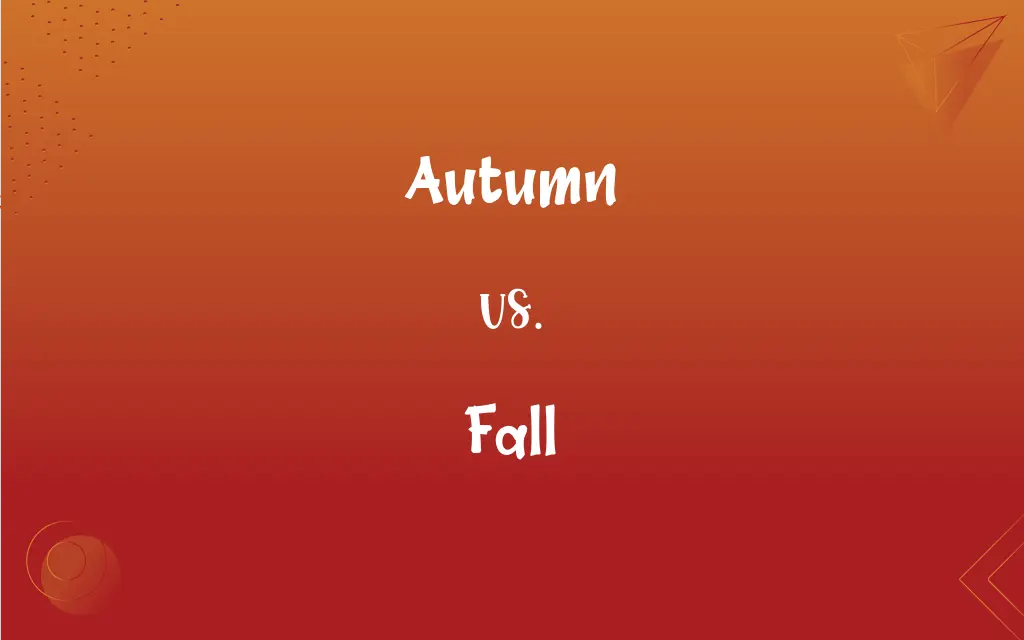Autumn vs. Fall: What's the Difference?
Edited by Janet White || By Harlon Moss || Updated on October 13, 2023
Autumn and fall refer to the season between summer and winter; "autumn" is widely used in British English, while "fall" is common in American English, both implying the transition of foliage and weather.

Key Differences
Autumn is recognized globally as a term to define the season between summer and winter, highlighting a period where leaves change color and fall, temperatures drop, and days gradually become shorter. Conversely, fall, while essentially representing the same seasonal transition, primarily finds its use within American English. These terms encapsulate a season often associated with vibrant leaves, harvest, and a preparatory phase before winter.
In the intricacies of language and usage, autumn often carries a slightly more formal and poetic connotation than fall. The term "autumn" finds its roots in the Latin word "autumnus," imparting a classic and, at times, a more sophisticated flavor to dialogues and writings. Fall, on the other hand, stems from old Germanic languages, and its use is thoroughly imbedded in American vernacular, reflecting a casual and straightforward reference to the season.
Despite being synonymous, these words echo the cultural nuances and linguistic paths that English has traversed through time and geography. Autumn often resonates with European and specifically British contexts, embodying a rich tapestry of historical, cultural, and literary associations. Fall, although understood globally, paints a picture that is quintessentially American, embodying the New World’s adaptation and evolution of the English language.
Moreover, the utilization of “autumn” and “fall” can be stylistic, chosen for their auditory and visual implications in communication. Autumn might be selected for its soft, open vowel sounds in poetic or lyrical contexts, presenting a gentle auditory aesthetic. Fall, while semantically equivalent, might be chosen for its short, succinct phonetics in contexts where brevity and directness are prioritized.
Both "autumn" and "fall" carry a plethora of symbolic, metaphorical, and literal significances that extend far beyond mere nomenclature for a season. They frame a time where nature undergoes visible transformation, often standing metaphorically for themes of change, maturity, and the ephemeral nature of life, providing a rich thematic palette for exploration and expression across various forms of media and literature.
ADVERTISEMENT
Comparison Chart
Usage
Predominantly used in British English.
Predominantly used in American English.
Etymological Origin
Originates from the Latin word “autumnus”.
Derived from Old Germanic languages, related to "falling leaves".
Connotation
Often considered slightly more formal and poetic.
Generally viewed as more casual and straightforward.
Phonetics
Contains soft, open vowel sounds.
Has a short, clear phonetic structure.
Cultural and Geographic Association
Strongly associated with British and European contexts.
Firmly rooted in American culture and language.
ADVERTISEMENT
Autumn and Fall Definitions
Autumn
Autumn is associated with harvest, as many crops are traditionally gathered during this season.
The farmers worked tirelessly through autumn, ensuring every crop was harvested before the first frost.
Fall
Fall is a season characterized by diminishing temperatures and falling leaves.
The fall brought a mesmerizing array of colorful leaves blanketing the streets.
Autumn
Autumn often serves as a precursor to winter, introducing cooler temperatures and shorter days.
As autumn unfolded, the days became noticeably shorter, and the air adopted a crisp coolness.
Fall
In a U.S. context, fall marks the commencement of the academic year for many institutions.
Students adorned in warm sweaters returned to campuses nationwide to embark on a new fall semester.
Autumn
Autumn, symbolizing transition, often stands metaphorically for change and maturity in various contexts.
The novel used autumn to allegorically represent the protagonist's journey into introspection and acceptance.
Fall
Fall is synonymous with the harvest period when various crops are collected.
Pumpkins of all sizes were harvested during the fall, ready for the Halloween festivities.
Autumn
Autumn is a season marked by the shedding of leaves and a decline in temperatures.
The forests were ablaze with color during autumn, presenting a breathtaking panorama.
Fall
In American culture, fall often represents a time of familial gatherings, notably Thanksgiving.
Families across the nation travel to be with loved ones during the fall, honoring Thanksgiving traditions.
Autumn
In literature and art, autumn frequently embodies themes of temporality, decay, and beauty.
The poet marvelously intertwined the ephemeral beauty and latent decay persistent through autumn, offering a melancholic yet beautiful imagery.
Fall
Fall can symbolize a phase of decline or transition in metaphorical contexts.
The storyline depicted the empire's fall, illustrating the impermanence of power.
Autumn
The season of the year between summer and winter, during which the weather becomes cooler and many plants become dormant, extending in the Northern Hemisphere from the autumnal equinox to the winter solstice and popularly considered to include the months of September, October, and November; fall. In the Southern Hemisphere autumn includes March, April, and May.
Fall
To drop or come down freely under the influence of gravity
Leaves fell from the tree.
Autumn
A period of maturity verging on decline.
Fall
To drop oneself to a lower or less erect position
I fell back in my chair. The pilgrims fell to their knees.
FAQs
What is autumn known for?
Autumn is known for cooler temperatures, changing leaf colors, and being a transition from summer to winter.
Why is autumn associated with harvest?
Traditionally, autumn has been a crucial time for harvesting crops before winter sets in.
Do all countries experience an autumn season?
Not necessarily, equatorial and some tropical regions may not experience distinct autumnal characteristics.
Are autumn and fall used interchangeably?
Yes, they can be used interchangeably as they refer to the same season.
How is fall symbolized in literature?
Fall is often symbolized as a time of change, maturity, and preparation for an ending or rest.
Is the weather during fall the same worldwide?
No, fall weather can vary widely depending on geographical and climatic conditions.
Why is fall called fall?
"Fall" originates from phrases like "the fall of the leaf," referring to trees shedding leaves during this season.
Can fall refer to something other than a season?
Yes, "fall" can also indicate the action of moving downward or a decrease in size, amount, or strength.
Which months are generally considered fall/autumn?
Fall/autumn typically encompasses September, October, and November in the Northern Hemisphere.
What is "Indian summer" in the context of fall?
An Indian summer refers to an unusually warm and dry period during late fall.
Why do leaves change color in the fall/autumn?
The decline in chlorophyll production allows other pigments in leaves to become visible, changing their color.
Does fall/autumn occur at the same time globally?
No, in the Southern Hemisphere, fall occurs during March, April, and May.
Is autumn typically regarded as the start or end of a year in any culture?
In various cultures and contexts, autumn can symbolize the end of a cycle, preparing for renewal or rest during winter.
What is the main difference between autumn and fall?
The primary difference lies in regional usage; "autumn" is preferred in British English, while "fall" is more common in American English.
Is autumn used in American English?
Yes, while "fall" is more common, "autumn" is also understood and used in American English.
What events are typically associated with fall in the USA?
Notable events include Halloween, Thanksgiving, and various harvest festivals.
What is the autumnal equinox?
The autumnal equinox marks the point when day and night are approximately equal, signaling the start of autumn.
How is fall celebrated in different cultures?
Fall celebrations can vary, with themes often revolving around harvest, change, and preparation for winter.
Are the words autumn and fall derived from Latin?
"Autumn" is derived from Latin, while "fall" has Germanic roots.
What crops are typically harvested in fall?
Common fall crops include pumpkins, apples, squash, and various grains.
About Author
Written by
Harlon MossHarlon is a seasoned quality moderator and accomplished content writer for Difference Wiki. An alumnus of the prestigious University of California, he earned his degree in Computer Science. Leveraging his academic background, Harlon brings a meticulous and informed perspective to his work, ensuring content accuracy and excellence.
Edited by
Janet WhiteJanet White has been an esteemed writer and blogger for Difference Wiki. Holding a Master's degree in Science and Medical Journalism from the prestigious Boston University, she has consistently demonstrated her expertise and passion for her field. When she's not immersed in her work, Janet relishes her time exercising, delving into a good book, and cherishing moments with friends and family.































































